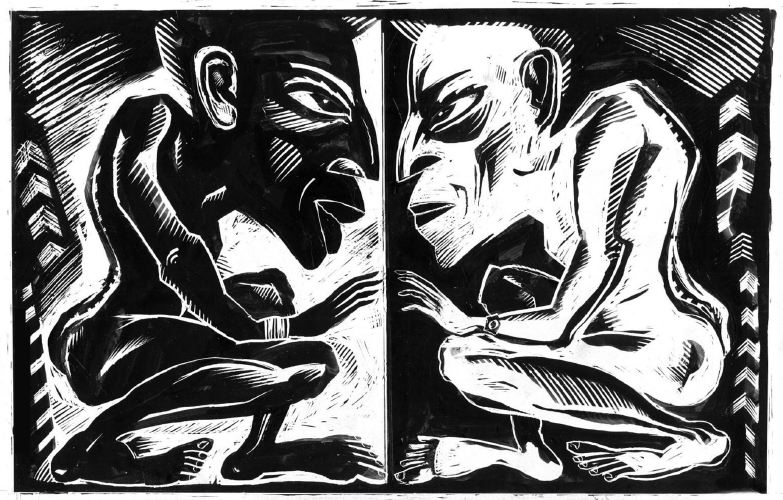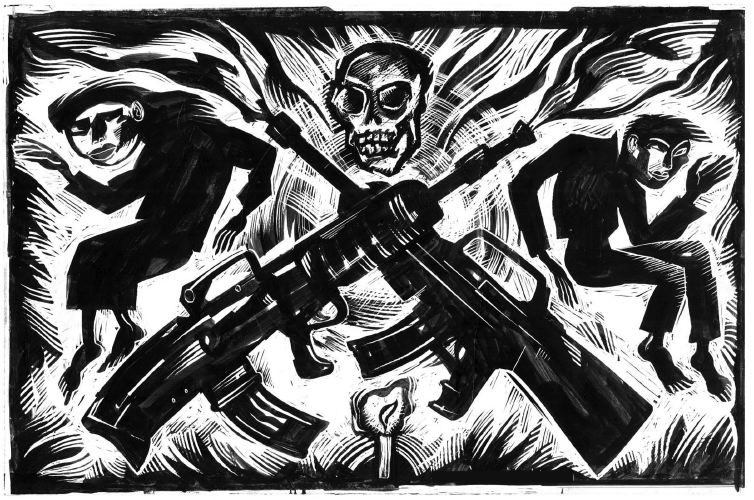Social media functions as a public meeting place that, beyond its tendency to sometimes enclose us in bubbles, allows us to sound out opinions on current events. Recently, for instance, we have been able to witness the demand that a certain part of the left close ranks with the government of Evo Morales regarding the political crisis following the presidential election in Bolivia.
Here, to close ranks means that any analysis of the situation that entails a certain level of complexity is rejected out of hand. If anyone dares to criticize the Morales government’s policies or echo the popular discontent contained in the protests against him, they can only be serving Yankee imperialism. They are accused of “legitimizing” the coup or, worse, of bearing responsibility for recent deaths.
This is the strategy of the former Bolivian vice president, Álvaro García Linera, who, in an interview with Telesur, pointed out the “correct” side of critical currents, suggesting that on the other side lie only fascism and dead people. Either you’re with me or you’re against me—a classic. He proposes that we “choose” between his increasingly authoritarian state populism and a savage neoliberalism with post-fascist characteristics. We are to “pick” the least bad option, thus erasing the movement for Morales’ overthrow that came from below.
Political processes are not usually stories of good and evil in which only one “correct” position is possible. Nonetheless, in ongoing conflicts regarding international politics, a line has been drawn with a ruler, and we are required to join one side or the other. Any ambiguity is punished with furious attacks. In this way, imaginaries are created about certain places, such as Venezuela, Bolivia, or Nicaragua, in which ideology provides a predetermined position. There is no nuance. US imperialism or the geostrategy of world powers become the easy answer that impedes critical thought: oil explains Venezuela, lithium explains Bolivia, and thus everything is explained.

U.S. interventionism has spent these past twenty years facing processes of change in Latin America, but what we have to ask ourselves is: why are these interventions happening now and not before? What has changed? That is, why have progressive governments lost popular support, often among the same groups that initially brought them to power? Dogma is not useful in understanding this phenomenon. Politics is not a religion. This is why feminist Raquel Gutiérrez calls on us to “undo the logic of polarization, confrontation, and violent social conflict that today are tearing apart the cities and regions of Bolivia.”
The Coup-Supporting Latin American Right
It is true that what were called “revolutions” in Latin America entailed, for a time, a hope for those of us who were looking for alternatives to neoliberalism. Many of us went to work there—to Venezuela, in my case—committing ourselves to those very processes that are now faltering. We bet on the promise that other paths were possible. We saw liberating prospects in the constituent assemblies of Venezuela, Bolivia, and Ecuador, and in their first steps, when power was redistributed. We saw people who had been excluded from representative democracy—landless peasants, favela inhabitants, Indigenous people—emerge into politics. If it was not a revolution, we at least recognized effective forms of redistribution of wealth that were carried out in those countries, and we learned a few things. We also discovered the face of a virulent, coup-plotting opposition driven by the interventionist strategy of the United States, which has supported and financed it under the pretext of “promoting democracy.”
The lack of alternatives, today as before, makes it especially difficult to take a stance publicly, but it also gives the governments in power an excuse to erase from the map any opposition from below.
Today in Bolivia, we recognize the face of that violent opposition and its new style, linked to the worldwide post-fascist turn, a face marked with racism and anti-feminism, and it seems like we can only support “the other side.” But what is the other side? Is it our side? Are we defending the same thing? In Bolivia, workers’ organizations like the Bolivian Workers’ Center (COB) and the Union Federation of Bolivian Mine Workers (FSTMB)—who once contributed to Morales’ victory—and Indigenous and feminist movements—who are now fighting on the front lines against the coup—were the first to denounce both the problems of the extractivist economic model and the fact that Morales had stretched Bolivian democracy, which has helped smooth the path of the post-fascist coup that is taking place today.
The most recent example is the calling of a referendum in 2016 to increase the number of presidential terms allowed under the constitution so Morales could run again. He lost the referendum but had the result annulled. This catapulted the electoral campaign of Carlos Mesa to prominence, and Mesa became the face of the opposition, capitalizing on the discontent in Bolivia. What would our position be if something like that happened in our country? Or would it depend on who was ignoring democratic procedures? Perhaps it is possible to remain in power by subverting democracy, but that course of action generates distrust among the government’s supporters, opens a path for the opposition, and hinders the viability of the project of change.
I suppose Morales was afraid of the Ecuadorian example, where the successor of Rafael Correa, Lenín Moreno, completely dissociated himself from the “citizen’s revolution” and began dismantling the successful neo-Keynsian and redistributive policies of the previous government. But the slogan of the Confederation of Indigenous Nationalities of Ecuador (CONAIE) is clear: “neither Moreno nor Correa.” It is clear that no one governs “for all.” But it is also clear that many of these progressive processes of change have been shedding the support of social sectors—sectors that are essential to stopping coups when they occur, but which demand, in turn, to be kept in mind.
It is precisely the closing of ranks that is becoming more imperious just now that Latin American populism, which was once a model for some European parties and movements, is in crisis. The inability to implement projects that transcend the reality of an autocratic leader is one of its greatest weaknesses. Latin American populism lacks the capacity for internal renewal to face the contradictions and problems that its governing actions have unleashed. And, above all, it has not put in place mechanisms to create space for internal criticism. This is due, first and foremost, to the fact that any dissidence among its supporters—or alternative proposals from within—have been silenced and marked as “the enemy.” This is a tragedy to which the history of the revolutions born out of the great utopias of the twentieth century has conditioned us.

These populist options, moreover, have managed to either assimilate or wipe out any supportive option from the left—just like how it has absorbed, as in the case of Bolivia, independent social movements and unions, which has progressively eroded their social and political bases. As José Lastra explains, “by implementing a model of state capitalism clearly controlled from above, Evo helped reinforce his position within the party and the executive branch at the same time as he alienated the communities that he had theoretically come to represent.” Today, the result of the quashing of criticism is that, when popular discontent increases because the limits of extractive development policies have appeared, the only available options are on the right, the revanchist right. There are no alternative political spaces for the left. Only the rebuilding of the old, dominant bloc remains, and it has the face of a coup plotter.
There Is No Revolution Without Democracy
It is necessary, then, to defend the role of criticism. We are not talking here about thoughts formed in a library or in the ivory tower. We are talking about protests that are born from below and from within social processes—from those who are destined to form part of the anti-government movements when the inertia of the state departs from their interests. Without that criticism, revolution is simply not possible.
Nonetheless, in these processes, if anyone tried to denounce corruption, the increasing influence of the army in Venezuela, or the weakness of the extractive model in Bolivia and its consequences for communal forms of living, their voice was silenced with the argument that they were “providing weapons to the enemy.” It’s a quintessential tool of state bureaucracies to quash internal criticism—or to prevent the emergence of alternative leaders.
But where is the enemy when the interests of old and new oligarchies infiltrate the new governments? Thus, the implication is that “the revolution” has to be created on a foundation of silence, obedience, and the paralysis of thought. Yes, the enemy is terrible; but without internal criticism, revolutionary processes atrophy. There is no possibility of radical transformation without it. To impede criticism allows power to be maintained from the center, but it also produces a centripetal movement that throws out supportive people and movements at a very high cost for a revolution. In this environment, revolutions die, and the worst defeat is self-inflicted by internal decomposition, which wipes out any possibility of change for many years. And then the monsters return.
The People of Nicaragua Provide the Dead
The case of Nicaragua is certainly bloody. In Madrid, we have seen attempts to boycott talks by feminists from that country—in other words, we have seen people who consider themselves “leftists” trying to keep individuals who are persecuted by the state from speaking. During last April’s protests, the International Court of Human Rights documented at least 300 murders—Nicaraguan social organizations put the number at 400—and more than 1,300 injuries in the repression of the protests. Nonetheless, the Latin American left has closed ranks with its declaration of support for the “Sandinista Revolution” in the face of the “coup d’état” in its declaration from the last São Paulo forum. It is as though any popular protest can be called a “coup,” or as though the dead are not worth the same depending on who killed them, and the supposed ideological sympathy that it should garner from us. Are they not our dead?
I’d like to make a call to abandon binary logic. To people who are ideologically close, I would say that it is not necessary to agree on everything, but it is essential to have spaces where it is possible to debate, without violence or sectarianism. Because we will agree on other things, and we are going to have to continue collaborating. The enemy is dangerous, and it is urgent, both here in Europe and in Latin America, to look for situations that help resolve conflicts. A deep analysis of what is happening is a first step toward looking for an exit from the labyrinth and coming together to build radical, democratic alternatives to a present devastated by neoliberalism.
This piece appeared in CTXT Revista Context on December 4, 2019. Translated by Chris DeLorenzo for Toward Freedom.
Author Bio
Nuria Alabao is a journalist and holds a doctorate in anthropology. She is a member of the Fundación de los Comunes.
